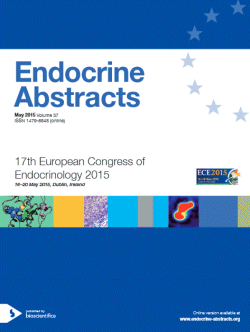Oral Communications
Reproduction
ea0037oc2.1 | Reproduction | ECE2015
Decanoic acid inhibits androgen production in vitro and in vivo by regulating HSD3B2: a promising drug candidate for the management of hyperandrogenism in polycystic ovary syndrome
Lee Bao Hui , Tan Huey Min , Li Yu , Zhang Zhiwei , Indran Inthrani Raja , Li Jun , Yong Eu Leong
ea0037oc2.2 | Reproduction | ECE2015
Lipid accumulation product as a surrogate marker of metabolic syndrome in different phenotypes of polycystic ovary syndrome
Macut Djuro , Antic Ivana Bozic , Bjekic-Macut Jelica , Milutinovic Danijela Vojnovic , Ilic Dusan , Popovic Bojana , Bogavac Tamara , Kastratovic-Kotlica Biljana , Stanojlovic Olivera , Isailovic Tatjana , Elezovic Valentina , Ognjanovic Sanja , Petakov Milan , Damjanovic Svetozar
ea0037oc2.3 | Reproduction | ECE2015
Restoration of fertility in hypogonadal LH receptor null background male mice by a constitutive active mutant FSH receptor
Oduwole Olayiwola , Peltoketo Hellevi , Poliandri Ariel , Vengadabady Laura , Huhtaniemi Ilpo
ea0037oc2.4 | Reproduction | ECE2015
Low free testosterone is associated with hypogonadal symptoms in men with normal total testosterone levels: results from the European Male Ageing Study
Antonio Leen , Wu Frederic , O'Neill Terrence , Pye Stephen , Carter Emma , Finn Joseph , Laurent Michael , Huhtaniemi Ilpo , Rutter Martin , Rastrelli Giulia , Forti Gianni , Bartfai Gyorgy , Casanueva Felipe , Kula Krzysztof , Punab Margus , Giwercman Aleksander , Claessens Frank , Decallonne Brigitte , Vanderschueren Dirk
ea0037oc2.5 | Reproduction | ECE2015
Bisphenol A-induced epithelial-mesenchymal transition was reversed with a phytoestrogen, genistein via oestrogen receptor and downregulation of transforming growth factor-beta signalling pathway
Kim Ye-Seul , Hwang Kyung-A , Choi Kyung-Chul




